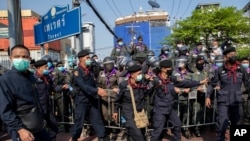Thai authorities January 1 made their 38th arrest of a pro-democracy activist in recent weeks under the country’s tough lèse majesté law as authorities crack down on the country’s unprecedented protest movement.
That law, Section 112 of the Thai criminal code, forbids defamation of the king and provides for three to 15 years’ imprisonment for violations.
The law had been dormant since King Maha Vajiralongkorn succeeded his father, King Bhumibol Adulyadej, who died in 2016. The Thai government, though, is now using it to try to stamp out continuing protests calling for the government to resign, a new constitution and reform of the monarchy.
Thailand has been a constitutional monarchy since 1932, but 13 successful coups by the arch-royalist army have inflated the power of the palace over elected governments.
The protesters who lit up Bangkok’s streets for most of last year accuse Vajiralongkorn of wading beyond the charter by shifting palace wealth and elite army units under his direct control - as well as moving the pieces on the Thai political chessboard from behind the scenes.
They want the return of the crown’s multibillion-dollar wealth to the stewardship of the people rather than the king, the “112” law to be scrapped and the palace to be put firmly under the constitution.
Authorities are now struggling to catch up with protesters whose attacks on the monarchy - and the law which shields it - are visible both on banners hung from bridges and across the internet in memes and hashtags.
Authorities are hitting back at the protests with allegations protesters have been “threatening, defaming or insulting” the royal family, which is the behavior banned in the law.
According to the human rights group Thai Lawyers for Human Rights, the activist arrested January 1, whose name has been given only as “Nut,” was a Facebook administrator of a protest group and was bailed out January 2 after being charged under Section 112 for selling a calendar using the movement’s satirical rubber duck symbol to allegedly mock the monarchy.
“In just a matter of weeks 112 charges have continued to surge,” the group’s tweet said.
Some people have been arrested multiple times as the 112 law is used against protesters for perceived transgressions ranging from mocking the king’s fashion choices to urging Germany, where until recently Vajiralongkorn has spent much of his time, to probe the legality of his domicile there.
“Even the slightest critical reference to the monarchy is now punishable,” Sunai Phasuk of Human Rights Watch told VOA.
The cascade of charges also points to problems with a nebulous law that allows any member of the public to bring charges with police, who routinely refer the complaints to the courts no matter how thin the case may appear.
The police who filed the charge against the 38th person “couldn’t even answer to the lawyer how this violated Section 112. This was purely political,” said Khemthong Tonsakulrungruang, a law scholar at Bangkok’s Chulalongkorn University.
“This law [Section 112] is being used all over the place. Anyone can file this charge, and the Supreme Court has never once set a guideline as to how this law should be used. It’s still very much the Wild West,” he said.
The charges under the law have caught the eye of the Office of the United Nations High Commissioner for Human Rights, which last month condemned the crackdown on free expression, particularly the arrest of a 16-year-old after taking part in a catwalk satirizing the royal family’s fashion style.
‘Stepping beyond fear’
The lèse majesté law is also, at least for now, failing to silence the protest leadership, most of whom have been bailed out of jail on multiple charges, and who say that every time the law is used it loses some of its power.
“People do not fear 112 anymore,” said Attapon Buapat, a protest leader who has been charged under the law.
“Everyone fighting this battle has been prepared for our freedoms and rights to be violated one day. We have stepped beyond that fear for quite some time now. Whatever will be, will be,” he said.
Protesters paused their demonstrations before Christmas and a second wave of COVID-19 has hit Thailand, spurring partial lockdowns across much of the country. It is not clear when protesters will mass in large numbers again.





